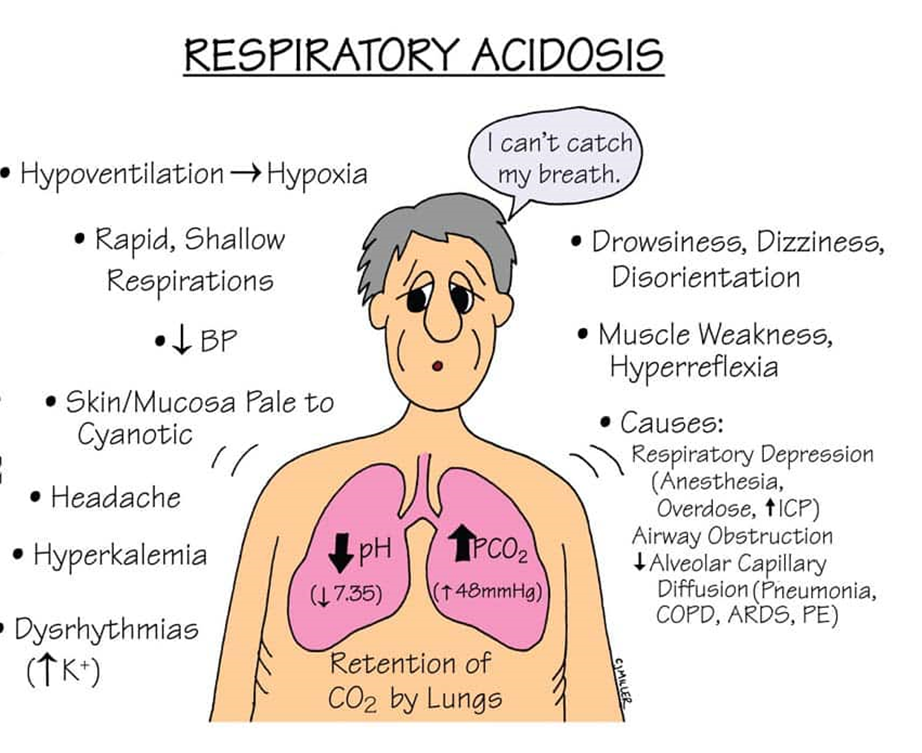The nurse understands causes of respiratory acidosis include: (SELECT ALL THAT APPLY)
asthma
hyperventilation
chronic obstructive pulmonary disease
renal insufficiency
pneumonia
Correct Answer : C,E
A. Asthma:
Explanation: Asthma is associated with respiratory alkalosis, not respiratory acidosis. In asthma, there is often hyperventilation leading to a decrease in carbon dioxide levels.
B. Hyperventilation:
Explanation: Correct. Hyperventilation can cause respiratory alkalosis, not respiratory acidosis. It leads to a decrease in carbon dioxide levels.
C. Chronic obstructive pulmonary disease (COPD):
Explanation: Correct. Conditions like COPD can lead to respiratory acidosis. In COPD, there is impaired ventilation, leading to an accumulation of carbon dioxide.
D. Renal insufficiency:
Explanation: Renal insufficiency is not a direct cause of respiratory acidosis. Respiratory acidosis is primarily related to respiratory system dysfunction.
E. Pneumonia:
Explanation: Correct. Pneumonia can cause respiratory acidosis. In pneumonia, there may be difficulty in eliminating carbon dioxide due to impaired gas exchange.

Nursing Test Bank
Naxlex Comprehensive Predictor Exams
Related Questions
Correct Answer is D
Explanation
A. Respiratory acidosis:
This occurs when there is inadequate ventilation, leading to an accumulation of carbon dioxide (CO2) in the blood. In the context of a nasogastric tube attached to low suction, respiratory acidosis is not the primary concern. It is more associated with conditions like respiratory depression or lung diseases.
B. Metabolic acidosis:
Metabolic acidosis results from an excess of acid or a loss of bicarbonate. It is not the typical outcome of a nasogastric tube attached to low suction. Conditions like diarrhea or renal failure are more commonly associated with metabolic acidosis.
C. Respiratory alkalosis:
Respiratory alkalosis occurs when there is excessive loss of carbon dioxide from the body, often due to hyperventilation. This is not a typical consequence of a nasogastric tube attached to low suction.
D. Metabolic alkalosis:
Metabolic alkalosis is characterized by an excess of bicarbonate or a loss of acid. In the given context, with the nasogastric tube attached to low suction, there is a potential loss of gastric acid, contributing to metabolic alkalosis.
Correct Answer is D
Explanation
A. The need to monitor urine for the presence of albumin:
Explanation: Monitoring urine for albumin is more associated with microvascular complications, particularly diabetic nephropathy. When the kidneys are affected, albumin may leak into the urine. This is not a macrovascular complication.
B. The relationship between kidney function and blood glucose levels:
Explanation: The relationship between kidney function and blood glucose levels is important, but it is more directly related to microvascular complications, particularly diabetic nephropathy. High blood glucose levels over time can damage the small blood vessels in the kidneys.
C. The need for frequent eye examinations for clients with diabetes:
Explanation: This is related to microvascular complications, specifically diabetic retinopathy. Changes in the small blood vessels of the retina can lead to vision problems. While important, it's not directly addressing macrovascular complications.
D. The fact that clients with diabetes have an elevated risk of myocardial infarction:
Explanation: This is the correct answer. Macrovascular complications involve large blood vessels and are associated with conditions such as coronary artery disease, which increases the risk of myocardial infarction in individuals with diabetes.
Whether you are a student looking to ace your exams or a practicing nurse seeking to enhance your expertise , our nursing education contents will empower you with the confidence and competence to make a difference in the lives of patients and become a respected leader in the healthcare field.
Visit Naxlex, invest in your future and unlock endless possibilities with our unparalleled nursing education contents today
Report Wrong Answer on the Current Question
Do you disagree with the answer? If yes, what is your expected answer? Explain.
Kindly be descriptive with the issue you are facing.
